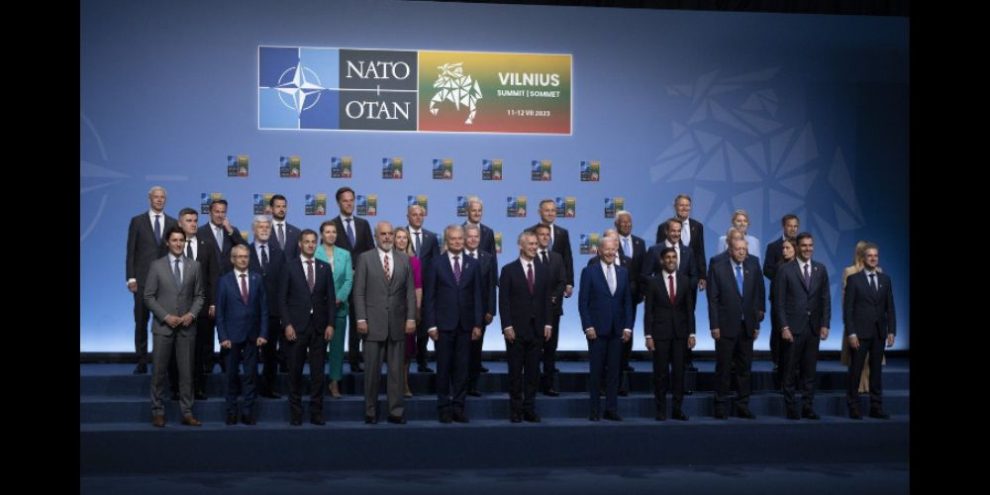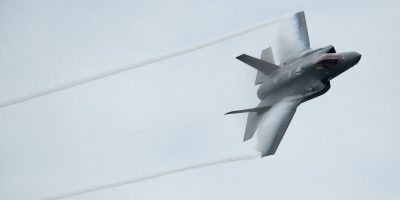
By Sarah Ritchie in Vilnius
Members of NATO agreed on Tuesday to let Ukraine join the military alliance "when allies agree and conditions are met" and fast-track the process for its future membership, although gave no timeline.
The leaders of the military alliance gathered in Vilnius, Lithuania, for their annual meeting also pledged to boost spending on national defence, even though Canada and other countries have for years failed to meet the previous target.
"We reaffirmed Ukraine will become a member of NATO and agreed to remove the requirement for a membership action plan," NATO Secretary-General Jens Stoltenberg told reporters on Tuesday.
“This will change Ukraine's membership path from a two-step path to a one-step path," he said.
Ukraine President Volodymyr Zelenskyy, who was on his way to Vilnius for the annual meeting, pushed back against the decision.
"It's unprecedented and absurd when a time frame is set neither for the invitation nor for Ukraine's membership," Zelenskyy tweeted.
“While at the same time, vague wording about 'conditions' is added even for inviting Ukraine," he said, referring to the statement NATO leaders released Tuesday.
"It seems there is no readiness to invite Ukraine to NATO or to make it a member of the Alliance.”
The statement released by NATO leaders also said members have agreed to make the existing target of two per cent of GDP the minimum spend each year, with one-fifth of that going toward major equipment and research and development.
The allies said they acknowledge that more is needed urgently to meet their commitments as members of the North Atlantic Treaty Organization.
But only about a third of the 31 members are already spending two per cent or more on defence.
Canada has agreed to the target but has not set out a plan to reach it, with current spending sitting just shy of 1.3 per cent.
Estonian Prime Minister Kaja Kallas said Tuesday that her message to allies is the threat from Russia is real and more is needed.
She and Prime Minister Justin Trudeau met earlier Tuesday, and she thanked him for Canada's commitment to send more troops and more money to a NATO mission in Latvia.
Trudeau and Defence Minister Anita Anand have routinely shrugged off suggestions Canadians are not pulling their weight.
But some observers say the time has come for Canada to signal to allies that it is serious about meeting its goals.
"I don't think that Canada can just keep its head down and avoid this," said Tim Sayle, a NATO historian and professor at the University of Toronto.
Sayle said allies will likely step up their pressure on countries like Canada, Germany, Denmark and Belgium, which are lagging behind.
Long-standing domestic issues are also playing a role in Canada’s global reputation, Carleton University professor Stephen Saideman said.
"They have not fixed the procurement processes," he said.
"They have a personnel shortage. Together, those two things make it hard, just simply hard, to spend money. Even if you allocate a lot of money, the actual spending of it is hard."
The changes at this year’s summit include new European defence plans and a defence production action plan, which Stoltenberg said earlier this week will "aggregate demand, boost capacity, and increase interoperability."
Defence procurement processes in Canada are notoriously long and often fraught with controversy as domestic and foreign players compete for lucrative contracts.
"In some ways, there could be attractive solutions to Canada working with other allies in the development and procurement space. The problem we run into is that procurement is such an important part of domestic politics," Sayle said.
Right now, Canadian company Bombardier is teaming up with General Dynamics in an effort to encourage the federal government let them bid on a contract to replace the aging Aurora surveillance aircraft fleet.
The government has insisted it is pursuing a competitive process, but it has taken steps to get approval from the United States State Department to purchase as many as 16 advanced P-8A Poseidon planes.
In a briefing before the NATO summit, senior government officials noted that the federal government has increased defence spending by 70 per cent since 2014. The officials provided a briefing to journalists under the condition of anonymity.
"It is certainly true this government has spent more money in the military. It's certainly true it has tried to spend more money in the military," Saideman said.
On Monday, Trudeau announced plans to spend $2.6 billion over three years to boost the Canadian presence on NATO's eastern flank by growing a Canada-led multinational battle group in Latvia to a brigade by 2026.
His government has also pledged around $40 billion on Norad modernization, along with billions on purchasing F-35 fighter jets and building new naval ships. All of that will increase the amount the country spends.
Earlier this year, a Washington Post report cited leaked documents that said that Trudeau had privately told U.S. officials Canada would not meet the spending target.
"Part of that was a matter of being honest about our limitations, and part of it was this government's priorities," Saideman said.
"It doesn't want to spend two per cent on the military, because that would mean either raising taxes or spending less money on something else."
In a statement on Monday, Conservative party defence critic James Bezan and foreign-affairs critic Michael Chong argued that Canada's role as a "trusted and reliable" partner has diminished.
"Our troops are struggling to do the jobs their country is asking of them due to personnel shortages and a lack of equipment," the statement said.
"Prime Minister Trudeau has a chance at the Vilnius Summit to make a commitment to address this neglect."
Banner image via The Canadian Press
This report by The Canadian Press was first published July 11, 2023.
— With files from Dylan Robertson in Ottawa and The Associated Press.





